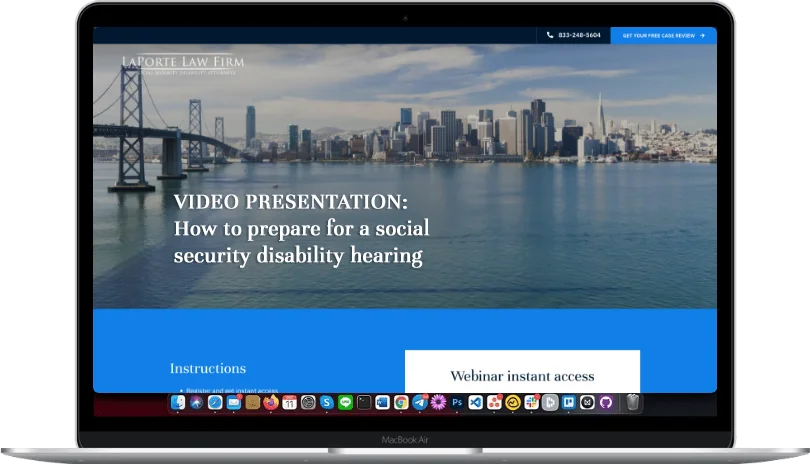
The phone interview by the Social Security Administration (SSA) can feel like the most critical moment in your journey toward receiving disability benefits. This interview is a standard and essential part of the Supplemental Security Income (SSI) application process.The questions can feel personal and complex, and the outcome feels monumental. Some people worry that just one wrong answer can lead to a technical SSI denial or the need to schedule yet another telephone appointment, further delaying the process. This blog post will discuss the importance of the SSI phone interview, and hopefully make the process much less stressful for the first-time SSI applicant.
The Importance of the SSI Phone Interview in Your Application
The SSI phone interview, also known as a disability interview, is the SSA’s method for verifying the information you’ve provided and gathering additional details about your life, including your financial and living situation. It allows a claims representative to take information about your bank accounts, the amount of assets you have access to, your living situation, and understand how you are paying for basic necessities such as rent and food.
This is a critical part of the SSI application process, since a thorough and accurate interview can reduce the wait times for your claim for Social Security disability benefits by providing the information the SSA needs to continue to process your claim
In this guide, we demystify the SSI phone interview process. We will break down the purpose of the interview, outline essential preparation steps, and walk through the key categories of interview questions you can expect. By the end, you’ll understand how to articulate your situation clearly and honestly, putting you in the best possible position for a successful outcome.
Understanding the SSI Phone Interview Process
Before you can prepare for the questions, it’s vital to understand the framework of the interview itself. Knowing who you’re speaking with, why they’re calling, and what to expect can dramatically reduce stress and improve your performance.
Purpose of the interview: Why the SSA asks these questions
The primary purpose of the SSI disability interview is not to catch you in a lie but rather to gather and verify information. Prior to obtaining your medical records and making a determination about whether you meet its criteria for disability, the Social Security Administration needs to confirm your personal details,understand your current marital status and living circumstances. In addition, for SSI claims, the SSA must assess your financial eligibility.
The SSA cannot continue to process your claim for disability benefits until they ensure that you meet the nonmedical low income requirements. In general, you must have no more than $2,000 in total assets if you are single, and no more than $3,000 if you are married. This determination is made on a month by month basis, so the SSA will review your financial situation for any month in which you are alleging disability. However, the SSA only pays retroactive SSI payments starting the month after the month of your application. For more information about SSI eligibility, check out our previous blog posts about the subject.
The phone interview questions are designed to ensure that you meet the nonmedical requirements of the SSI disability program before proceeding to the next steps of the process. The SSA also needs to review any financial assistance you may receive from friends or family members to pay for basic necessities such as food or rent. If you receive assistance with things such a shousing, the SSA may apply an in-kind support and maintenance” (ISM) deduction, which reduces the monthly SSI payment by one-third. To find out more about how assistance with shelter or food can reduce SSI benefits, check out our blog article here.
Who conducts the interview? The role of the claims representative
You will be speaking with a claims representative from the Social Security Administration. A claims representative is an SSA employee, typically from a local field office, who is in charge of receiving claims for disability and processing them. This individual is not a doctor and will not make the final medical decision on your case. Their job is to collect information accurately and ensure your application is complete. They will forward your file, including your medical records, to another agency called Disability Determination Services (DDS), where medical professionals will evaluate your claim. Your goal is to provide the claims representative with clear, detailed, and consistent information, which allows your claim to be processed as quickly as possible
General structure and duration of the call
Most SSI phone interviews last between 30 and 60 minutes, though some can be longer depending on the complexity of your case. The claims representative will typically begin by verifying your identity with personal information such as your Social Security number and date of birth. From there, they will move through various sections covering your living situation (how you pay your rent), any sources of income you might have, how you split the bills in your household, any checking accounts, savings accounts, 401ks, or vehicles you own.
Essential Preparation Before Your SSI Phone Interview
Preparation is the single most important factor in a successful interview. Walking into the call organized and ready will not only help you provide better answers but will help the claims representative process your case efficiently and effectively.
Gathering key documents and information
Do not rely on memory alone. Before the interview, gather and organize all relevant documents in one place. Create a file or binder that includes:
- Medical information: Prepare a list of all doctors, hospitals, and clinics with addresses and phone numbers. Include dates of visits, diagnoses, medications (including dosages and side effects), and treatments. Work history: You should also have a detailed list of your last 15 years of work. For each job, note the employer, job title, dates of employment, duties performed, and rate of pay. Be ready to describe the physical and mental demands of each role.
- Financial records: This is critical for SSI. Collect bank statements, pay stubs, tax returns, and records of any other income or financial support, including your monthly rent, monthly food expenses, and the account balances for any bank accounts you have access to. Have a list of your assets (cash, property, vehicles) and their values.
Key SSI Phone Interview Question Categories and How to Answer Effectively
The claims representative will guide you through several categories of questions, from personal identification to financial information. Understanding what they’re looking for in each category will help you provide focused and effective answers.
Questions about your financial information (SSI-specific)
To get a clear picture of your current financial situation, the claims representative may ask questions such as:
- Do you have any income right now?
- How much money is in your bank account?
- Do you own a car or any property?
- What is the make and model of your vehicle, and what is the current fair market value?
- Does anyone give you money for bills?
How to answer: This is where absolute honesty and accuracy are vital for an SSI claim. Disclose all sources of income and all assets, including cash, support from family, and free food or shelter. Be prepared to provide exact figures. Hiding or misrepresenting financial information can lead to an immediate denial.
Also, if your claim for Social Security disability is ultimately approved, the SSA will conduct another nonmedical eligibility review to make sure that you did not go over the SSI eligibility criteria from your initial SSI interview. Because Social Security disability cases can take months to even years, if your SSI case is approved on the issue of disability, you will need to provide your asset information for the intervening months.
Questions about your living arrangements and household
You may be asked questions about your home life and how shared expenses are handled.
- Who do you live with?
- Do you pay for your own food and shelter?
- How much is your rent or mortgage?
- How much money is spent on groceries in your household?
How to answer: The SSA asks these questions to determine your ISM, which can affect your SSI payment amount. Describe your living situation clearly. If you live with others and don’t pay your fair share of expenses, explain the arrangement honestly so that SSA can impose an accurate ISM deduction
Effective Communication Strategies During the Interview
How you communicate is just as important as what you communicate. Clear, consistent, and credible answers build a stronger case. Kindness and respect goes a long way too. Social Security employees are generally hard working, busy public servants, who are tasked with administering very complicated benefits systems. With the SSA facing budget cuts and staffing shortages, there’s more pressure on existing staff to process complex cases. Every SSI case requires Social Security employees to do a tremendous amount of work. By preparing all your financial documents prior to the appointment, along with any other necessary and relevant information, you are making it easier for the overworked employee on the other end of the telephone line to process your case and, hopefully, pay your benefit.
Asking for clarification when needed
If you do not understand a question, do not guess. Answering a question you’ve misunderstood can introduce inaccuracies into your file. It is perfectly acceptable to say, “Can you please repeat the question?”
If you do not know the answer to the question, if is okay to say the truth: “I’m sorry, I don’t know.” You can politely offer to follow up with the requested information, or if the Social Security employee has the time, search your records for the requested information.
The power of tone, clarity, and pace on a phone call
Speak clearly and at a moderate pace. Your tone should be cooperative and professional, even if you feel frustrated. Avoid sounding angry or defeated or frustrated. A calm, steady voice conveys confidence and credibility
Being honest and consistent (avoiding exaggeration or downplaying)
Honesty is nonnegotiable. There are potential penalties for providing false statements to a Social Security employee. Also, if the SSA discovers that you have too much assets to be SSI eligible, you will be sent an “overpayment” letter asking you to pay back all the benefits that you were wrongfully paid. This underscores why, as with many things, honesty is always the best policy when dealing with the SSA.
Wrapping Up: Why This Call Really Matters
The SSI phone interview is a pivotal step in your disability application. The Social Security Administration must determine that you meet certain nonmedical requirements—such as financial eligibility—in order to process your disability case further.
By gathering your financial documents and information about any assistance you receive for food and shelter beforehand, you are ensuring that your case is processed expeditiouslyAlso, understanding the purpose behind each category of interview questions — from your bank account information to your medical history — helps you provide concise, specific answers that make it easier for the interviewer to accurately assess your eligibility. . Maintaining a calm and cooperative tone and asking for clarification can also create a more productive and stress-free interview experience.
The disability benefits application process is a marathon, not a sprint. Treat this interview as a crucial stepping stone toward having your disability application processed and approved. If you feel overwhelmed, consider consulting with a qualified disability lawyer who can help you prepare and ensure your case is presented as strongly as possible. With the right approach, you can transform this daunting call into a confident conversation that accurately reflects your financial reality and puts you on the right track to securing the benefits you need.
LaPorte Law Firm is here to guide you through every step of your SSI application with experience, clarity, and care. Give us a call today.
FAQs
The SSA will ask about your income, your spouse’s income, any resources you may own, and your living situation to determine SSI financial eligibility.
Yes, a family member, a caregiver, or an attorney can assist you or speak on your behalf, especially if you have difficulty communicating or remembering details.















